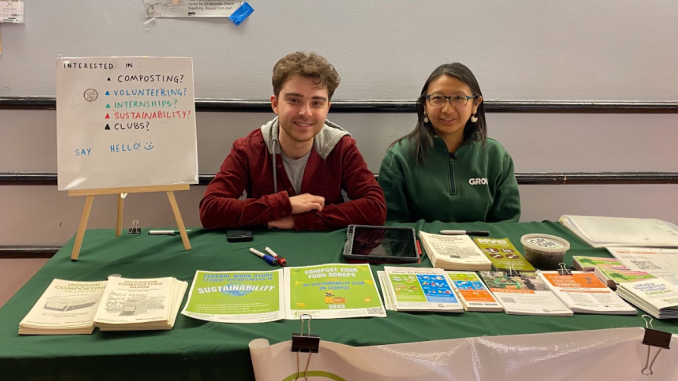
By Gabriela Flores
About 3.4 million tons of residential waste are produced in New York City each year. Approximately one-third of what is dumped consists of food waste and other compostable materials. These scraps are like gold to composting drop-off sites across the city that intend to divert organic scraps from landfills. At Brooklyn College, student leaders, campus sustainability administrators, and members of GrowNYC, an organization that works on the ground to organize composting efforts, are bringing composting to students on campus.
“This could also be the prime time to show people there is a better, alternative way to deal with food waste,” said Nathalie Huang, the president of Brooklyn College Sustainability Club and a GrowNYC compost coordinator. “Less food going into the trash means less waste that needs to be set outside on the curb for trash collection, and less potential food for rats and local wildlife to scour through.”
Composting is the process of recycling organic matter, such as uncooked fruit and vegetable pieces, that can decompose into a rich fertilizer for community gardens, street trees, houseplants, and other plant life.
Huang, who has worked with GrowNYC since 2021, has seen the ins and outs of food scrap drop-off sites, educating locals about how to compost properly and its overall necessity. Working every Friday at a site on Flatbush Junction, she’s become one of the over 60 compost coordinators with GrowNYC who have contributed to curbing less useful waste from hitting landfills. On campus, Huang is also a helping hand in the college’s budding composting program, an initiative that was first brought to her attention by Campus Sustainability and other Brooklyn College students.
Currently, there is no official site on campus where students can compost their organic scraps except for a bin that was recently installed in the Brooklyn College Eats Garden that sits by the Center for Performing Arts. However, only yard wastes or plant trimmings are allowed to be composted there. As organizers like Huang gear up to soft launch the composting program, they set their eyes on Boylan Hall’s cafeteria. Days and designated times have yet to be decided for when students can drop off their scraps. On the college level, locally reducing the trashing of food waste could help BC’s surrounding environment to reap the benefits, according to Huang.
“We’ll be saving waste and using it for a better purpose rather than allowing it to be sent to a landfill and polluting the environment with methane gas. Small changes make a big impact, and together, we can accomplish a lot,” she said.
As an urban sustainability major, Huang’s composting duties and habits that consider the environment’s well-being stem from her interest in the interrelatedness of social, environmental, and economic issues. Learning how these three components impact people is another pillar that interests Huang.
“There are so many existing problems in the world affecting all of us right now that is not good if we keep going down the same trajectory in the long term, and that’s what people mean when they say something is ‘not sustainable,’” she said.
When it comes to composting, Huang is well aware that the practice should be something that a person is comfortable doing. Since scraps are involved, with their subsequent odors and leaks, those starting to compost can use containers with lids to store their composting goods before dropping them off at a local site. The best option to avoid any messy mishaps is to place the containers in freezers. According to Huang, it’s important to remember that several public drop-off locations do not accept meat, fish, dairy, or bones.
As much as composting is important in deterring landfill wastes, she knows that not everyone would be open to the idea.
“Composting is great, but of course, part of the job is also knowing I cannot convince everyone to compost their food scraps,” said Huang, noting for several years, trash has typically been bagged and put on the curb for sanitation to pick up. “For many people, the very idea of separating their food waste from their regular trash and bringing it to a food scrap drop-off for composting is too much work for them, and yet, other people do care enough to do it.”
Like any initiative that comes from the ground up, those behind BC’s incoming composting program will gradually and steadily gain traction. In the meantime, Huang, alongside other members of her club and major, have promoted sustainability in other ways.
Last semester, in a leaf-raking event hosted by Campus Sustainability Coordinator Stalin Espinal and Carrie Sadovnik, the director of Environmental Health and Safety, Huang and other BC students raked 40 bags worth of leaves. On her end as BC Sustainability Club’s president, she’s been tabling with her colleague Mark Hachicho for student outreach, asking BC students about their thoughts on a food scrap drop-off on campus.
“I think the more nerve-wracking – and exciting – part of really getting the ball moving with this project is the first day when the food scrap drop-off is open. However, it’ll be interesting to record the numbers of participants and how many small bins of food scraps were collected each week,” said Huang, noting that other neighboring drop-off sites like hers in Bensonhurst usually start slow before picking up full steam from regular composters.
“I believe this shows consistency, and visibility with a drop-off site is what will help the pilot program to succeed over time, too,” she said.
BC students and faculty interested in sharing their input about the composting program can fill out a survey at: bit.ly.BCComposting.
